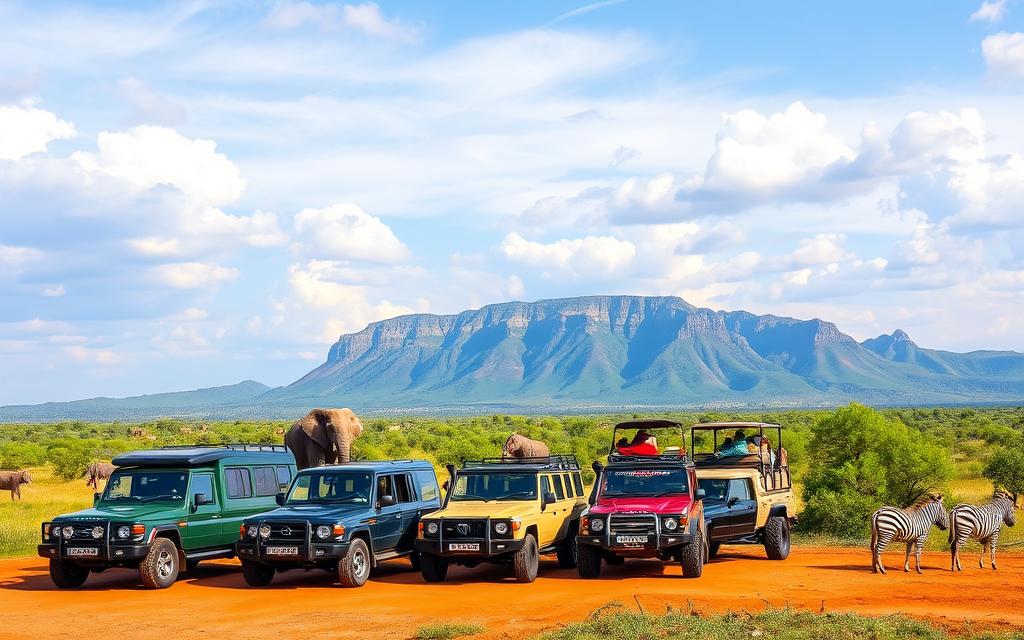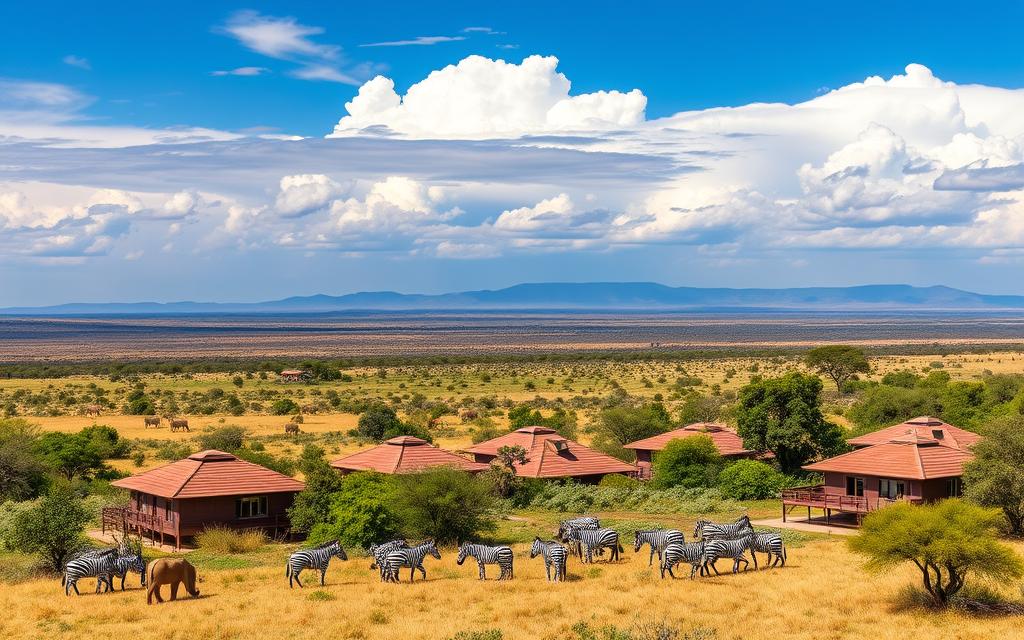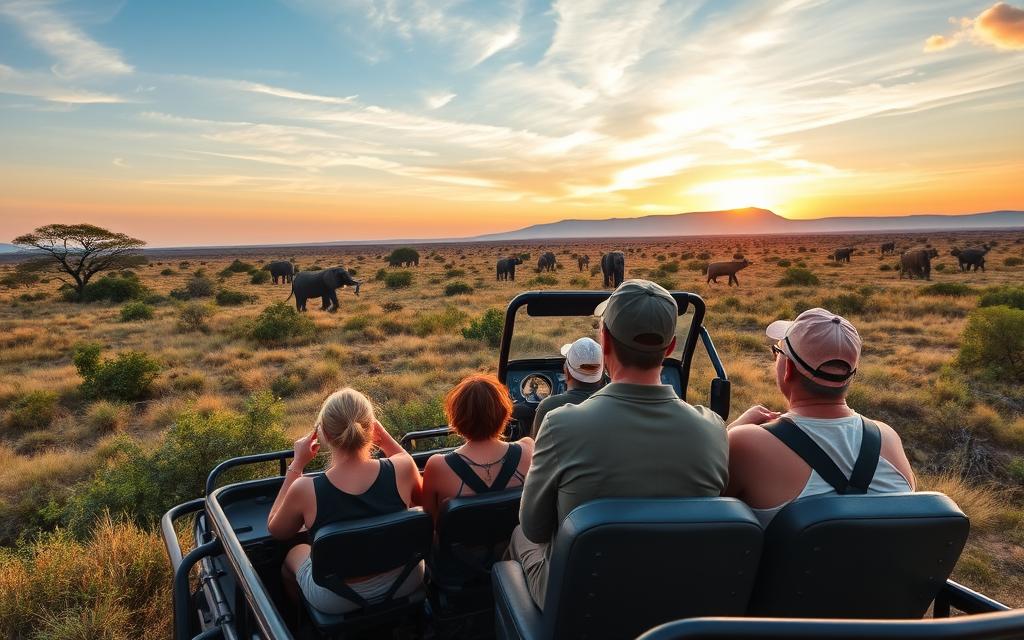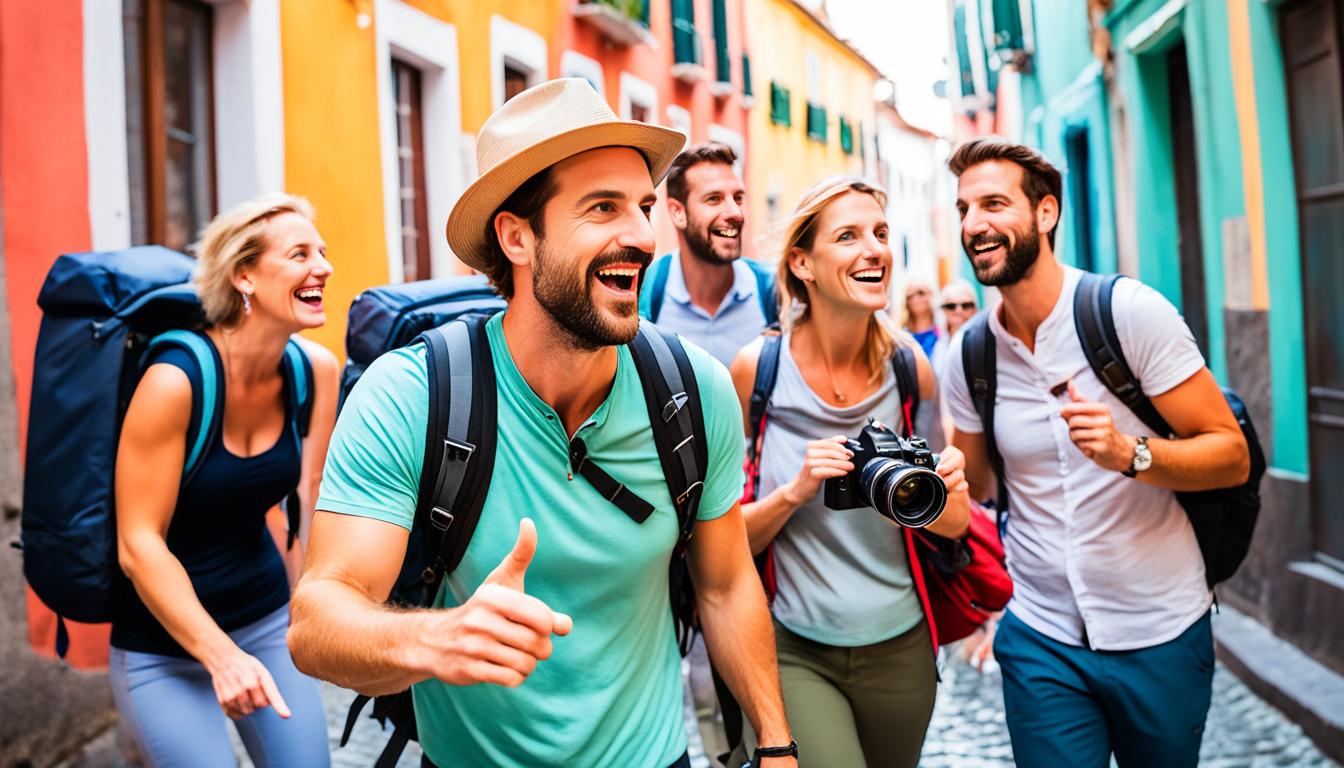South Africa is famous for its beautiful landscapes and diverse wildlife. It welcomes over 10 million tourists every year, many of whom go on safaris. If you’re wondering, “Is South Africa safe for safari trips?” don’t worry. Many people have great experiences without any problems. But, it’s important to take some steps to stay safe on your safari.
Even though South Africa is a great place to visit, you should be careful. Cities like Johannesburg and Durban have higher crime rates. But, you can lower your risk by following some safety tips. Going on an organized safari or tour can also make you safer.
Knowing how to stay safe on a safari in South Africa is key. Learning how to interact with animals, staying healthy, and keeping your vehicle safe are all important. South Africa also has rules to keep everyone safe from COVID-19, showing how serious they are about safety.
To have a worry-free safari, follow the advice of experts. Make sure you get the right vaccinations and have medical insurance. By staying informed and choosing a good safari operator, you can enjoy South Africa’s beauty while staying safe.
Understanding the Risks of South Africa Safaris
Going on a South Africa safari is an exciting adventure. It lets travelers see the rich wildlife and beautiful landscapes. But, it’s important to know the risks and take steps to stay safe.
Wildlife Encounters: Staying Safe
When exploring wildlife safety in South Africa, it’s key to stay alert and follow rules. Wild animals can be unpredictable. Even though millions visit each year, it’s rare for a tourist to die from an animal encounter.
Following park rules and listening to safari guides is crucial. They teach you to keep quiet, not disturb animals, and stay in the vehicle. Guides also carry guns for safety.
Potential Health Hazards
While enjoying the South Africa safari experience, remember the health risks. Getting the right vaccinations, like yellow fever, is important. Talk to a travel doctor before you go.
Protecting yourself from the sun is also key. Bring sunscreen, mosquito repellent, and a first aid kit. Some places, like Kwandwe Private Game Reserve, have low malaria risk, making them safer for visitors.
Vehicle Safety During Safari
Vehicle safety is vital during a South Africa safari. Always stay in the vehicle and avoid sticking your limbs out. This prevents accidents or animal attacks.
Also, watch out for low-hanging branches to avoid injuries. Wear neutral-colored clothes to blend in and not attract wildlife. Knowing the camp’s safety briefings and following the guide’s instructions will make your South Africa safari experience safer.
Choosing the Right Safari Operator
Choosing the right safari operator is key when planning your trip. Look for those who focus on safety and offer great experiences. This ensures your safari is both thrilling and safe.
Researching Reputable Companies
Start by exploring top safari spots like Maasai Mara and the Serengeti. Companies with over three years of experience, like Wayfairer and Niarra Travel, are often more reliable. They have learned a lot from their experiences.
Look for operators that offer exciting and ethical wildlife experiences. For example, Tswalu Kalahari offers researcher expeditions, and Grootbos has guided hikes with experts.

Reading guest feedback and checking company details is helpful. Make sure guides know a lot about local wildlife and special events, like the great migration. Talking directly to operators can also save money and show their customer service.
Understanding Their Safety Protocols
The top safari companies in South Africa have strict safety rules. Companies like African Bush Camps focus on activities that don’t harm the environment, like 4×4 game drives and guided walks. Important safety steps include:
- Keeping vehicle numbers low at wildlife sightings to avoid disturbing animals, as suggested by Mike Kirkinis.
- Following strict rules for observing endangered species, like those at HBD Principe for turtle safaris.
- Participating in important research and conservation work, like at Thanda Island and the African Penguin & Seabird Sanctuary.
Check if the company has insurance for their vehicles and keeps them in good shape. Also, make sure guides are well-trained and certified. This can make your safari much better.
| Operator | Years of Experience | Special Offerings |
|---|---|---|
| Wayfairer | 5+ | Customized Wildlife Tours |
| Niarra Travel | 3+ | Engaged Conservation Efforts |
| African Bush Camps | 10+ | 4×4 Game Drives, Guided Walks |
When choosing the best safari destinations in South Africa, also look at payment terms and policies. Be careful with money transfers and always check bookings directly. This helps avoid scams and ensures you’re dealing with a real operator.
Best Practices for Staying Safe on Safari
Going on a safari in South Africa means safety first. Knowing the right steps and precautions can make your trip better. Here are key *safety tips for South African safaris* to keep you safe and happy.
Following Guide Instructions
Safari guides are experts on animal behavior. They keep you safe. When they say to stay seated and quiet, it’s important. Animals see safari vehicles as safe, thanks to guides’ knowledge.
Standing up or making noise can scare animals. This can make them run or even attack. Safari.com has safely taken over 55,000 travelers to Africa since 2006. Always listen to your guide to avoid risks. Also, drink plenty of water to avoid stomach aches, which are often caused by dehydration.
Maintaining a Safe Distance from Wildlife
Keeping a safe distance from animals is key. Animals are easily spooked by humans. Being quiet and still helps keep them calm.
Experts say that loud noises can scare animals. So, staying silent is safer and lets you see them naturally. Africa has many protected areas where animals live freely. Respecting their space makes your visit safe and enjoyable.
“Human plus vehicle equals fine.” This shows a safe familiarity.
| Best Practice | Reason |
|---|---|
| Follow guide instructions | Guides understand animal behavior and ensure your safety |
| Maintain a safe distance | Prevents animals from feeling threatened |
| Stay hydrated | Avoids discomfort and health issues |
| Stay quiet | Minimizes disturbance to wildlife |
By following these *safety tips for South African safaris*, you stay safe and have a great time. South Africa is a top safari spot, but your actions help keep it safe for everyone.
Accommodations: Safe Places to Stay
Planning a trip to South Africa’s best safari spots means picking the right place to stay. Lodges and resorts offer luxury and safety in the wild. They meet tourists’ needs, ensuring a safe and comfortable stay.

Recommended Lodges and Resorts
Kwandwe Private Game Reserve and Tswalu Game Reserve are top picks. They offer great wildlife views and focus on safety. The Shamwari Sindile has lavish tents with modern comforts like Nespresso machines and plunge pools.
The Lion Sands River Lodge in Sabi Sand Game Reserve is known for its minimal human contact. It also has reservable treehouses. Honeyguide Tented Safari Camps in Kruger National Park focuses on community, with communal meals.
Makalali River Lodge in Hoedspruit has a huge 60,000-acre property. It offers private suites and raised decks for safe wildlife watching. The Royal Malewane in Kruger National Park provides luxurious suites with scenic walkways.
Safety Features to Look For
When choosing a place to stay in South Africa, look for safety features. Fenced areas, on-site security, and clear safety plans are key. These features help protect against wildlife and human risks.
Sanbona Wildlife Reserve’s lodges, like Tilney Manor and Dwyka Tented Lodge, follow strict safety rules. Guests in remote camps must follow wildlife safety guidelines.
Using mosquito nets, malaria tablets, and insect repellent is important. Proper planning for the season is also crucial, especially in areas like Kruger.
The Kruger Shalati – the Train on the Bridge offers a unique, safe experience. It’s on a bridge over the Sabie River, giving great wildlife views from a secure spot.
Understanding Local Laws and Etiquette
When you visit South Africa, knowing the local laws and customs is key. This is especially true for wildlife conservation and how you interact with communities. The country’s wildlife and culture are both vibrant and rich. To stay safe and show respect, tourists need to follow certain rules and be mindful of cultural differences.
Wildlife Conservation Laws
It’s vital to respect wildlife laws in South Africa. The government has strict rules to protect endangered species and their homes. Breaking these laws can lead to big fines or jail time. It’s important for tourists to learn about these laws and avoid harming the environment.
- Stay within designated areas during safaris to avoid disturbing wildlife.
- Refrain from feeding or attempting to touch animals, as this disrupts natural behaviors.
- Always dispose of waste properly to prevent pollution in protected areas.
Cultural Sensitivity in Communities
Being culturally sensitive in South Africa means understanding and respecting local traditions and norms. The country has 11 official languages, but English is widely spoken. Tipping around 10% is common, but leaving 12-15% is more usual in service industries.
- Respect traditional customs and dress codes when visiting local communities.
- Engage with locals politely and be open to learning about their way of life.
- Offer R5 to car guards as a standard thank you, or R10 for more useful services.
Load-shedding, or planned power outages, is common in South Africa. These can last from 2 to 12 hours a day, in eight stages with two-hour slots. Big hotels often have generators to help during these times.
Remember, showing cultural sensitivity in South Africa makes your trip better. It also helps build respect and understanding between you and the locals.
Traveling with Children: Additional Considerations
Planning family-friendly safaris in South Africa needs extra thought, especially with kids. Many safari operators, like Niarra Travel, offer special options for families. They make sure everyone stays safe, no matter their age. Choosing the right accommodations and activities for your little ones can make your trip both fun and safe.
Family-Friendly Safari Options
When picking family-friendly safaris, think about what’s available for kids. Some places have special programs for different ages. For example, some safari camps only let kids aged 4 to 12 join, and older kids can do more exciting things.
- Fenced Camps: These offer a safe space for kids to explore while parents relax.
- Children’s Programs: Lodges have programs that teach and entertain kids about wildlife.
- Age-Appropriate Activities: Young kids do safer activities, while older ones can try more exciting ones.
- Private Game Drives: Families with young kids often prefer private drives for safety and flexibility.
- Meal Considerations: It’s important to make sure kids have meal options they like. Some places even have earlier meal times for families.
Keeping Kids Safe in the Wilderness
Keeping kids safe is key, especially in the wild. There are important steps to take to make sure they have a great time without risks. Here are some key safety tips:
| Safety Aspect | Details |
|---|---|
| Sun Protection | Make sure kids wear hats, use sunscreen, and dress right to avoid sunburn. |
| Mosquito Repellent | Use mosquito repellent to keep bugs away, especially in areas with malaria. |
| Filtered Water | Give kids safe drinking water to prevent health problems. |
| Swimming Pool Safety | Always watch kids near pools, especially if they can’t swim. |
| Guideline Adherence | Follow rules in the camp to stay safe from wildlife. |
| Malaria Precautions | Take antimalarials and other precautions in high-risk areas. |
By thinking about these things, families can enjoy safaris in South Africa safely. They can make memories that last a lifetime while keeping their kids happy and safe.
Tips for Enjoying a Safe and Memorable Safari
Going on a safari in South Africa is thrilling. But, it’s important to stay safe and prepared. Packing the right things and knowing who to call in an emergency can make your trip better.
What to Pack for Safety
Packing right is key for a good safari. Bring sunscreen, hats, and clothes that won’t stand out. Wear long pants to avoid bug bites and sturdy shoes for rough roads.
Bring a jacket for chilly mornings and a camera or binoculars for up-close animal views. Safari books can also enhance your experience by teaching you about the wildlife.
Essential Emergency Numbers to Have Handy
Having emergency contacts in South Africa is crucial. Keep a list of wildlife authorities, medical facilities, and embassies. Major safari lodges and operators also offer great security and guides.
Talk to your doctor about vaccinations and malaria before you go. Carry enough cash for visa payments and other costs. Remember, US Dollars are widely accepted, and you’ll need adaptors for different plugs.
Tipping your guides and camp staff is a nice gesture. By packing smart and staying informed, you’ll have a memorable and safe safari in South Africa.
Source Links
- https://www.africanbudgetsafaris.com/blog/safety-on-safari/
- https://www.go2africa.com/african-travel-blog/safe-south-africa-travel
- https://www.wayfairertravel.com/inspiration/th/inspiration/african-safari-safety-guide
- https://www.niarratravel.com/stories/are-african-safaris-safe/
- https://www.travelweekly.com/Middle-East-Africa-Travel/Insights/What-to-look-for-in-an-African-wildlife-safari-operator
- https://whileinafrica.com/guide-when-choosing-a-safari-operator-in-africa/
- https://www.worldnomads.com/travel-wiser/survival/staying-safe-on-an-african-safari
- https://www.safari.com/blog/safety-tips-for-travel-in-africa
- https://guide.michelin.com/us/en/article/travel/michelin-guide-safari-hotels-of-south-africa
- https://www.go2africa.com/african-travel-blog/choose-the-safari-accommodation-of-your-dreams
- http://www.readysetsafari.com/safe-go-safari-south-africa/
- https://www.lonelyplanet.com/articles/things-to-know-before-traveling-to-south-africa
- https://www.journeytoafrica.com/blog/safari-etiquette-101
- https://www.safaribookings.com/blog/10-considerations-for-families-going-on-safari
- https://www.wildjunket.com/african-safari-with-kids-complete-guide/
- https://travelynnfamily.com/african-safari-with-kids/
- https://inafricaandbeyond.com/what-to-expect-on-a-safari/
- https://www.ubuntutravelgroup.com/blog/is-a-safari-in-africa-safe/
- https://www.safaribookings.com/blog/10-general-travel-tips-when-going-on-safari

